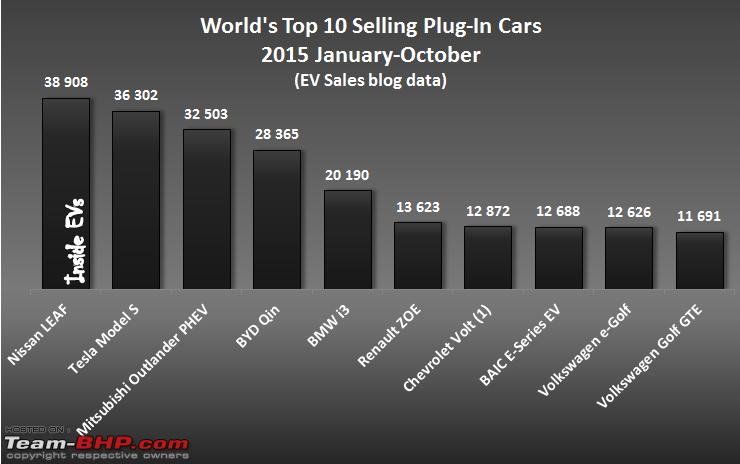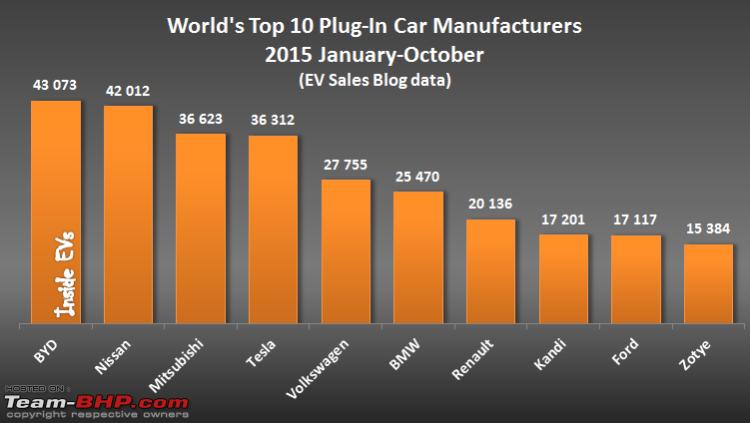Team-BHP
(
https://www.team-bhp.com/forum/)
The Automobile Industry is growing rapidly worldwide. But with this growth has come the increased focus on pollution and its ill effects. China is battling record levels of Smog. Delhi has been called a 'Gas Chamber' by the High Court, which in turn has prompted the government to implement the controversial odd-even rule. The Supreme Court in India has banned sales of diesel vehicles with capacity >2000 cc in the NCR Region. It is also proposing a green cess on smaller diesels.
All this has resulted in an increased focus on alternative energy sources to drive our vehicles. While in countries like US and China, this focus has been there for a few years now, with the recent happenings in India, this is on the way to becoming a focus here also. As we know one of the most common and successful alternate source of energy is electricity. Apart from electricity, CNG based vehicles have also seen moderate success.
Here we shall focus on electric vehicles and drill down into the Electric Vehicle Landscape- Some things looked at here.
- What are the types of EV's and a brief History
- The Electric Vehicles Initiative and a Worldwide picture of EV
- Incentives and subsidies for EV provided by countries.
- India and EV's.
- Top EV Sellers Worldwide.
- Top challenges for EV Adoption.
What are the types of Electric Vehicles? - Hybrid Electric Vehicles: Hybrid electric vehicles (HEVs) are powered by an internal combustion engine or other propulsion source that can be run on conventional or alternative fuel and an electric motor that uses energy stored in a battery. HEVs combine the benefits of high fuel economy and low emissions with the power and range of conventional vehicles. A wide variety of hybrid electric vehicles is currently available. Although HEVs are often more expensive than similar conventional vehicles, some cost may be recovered through fuel savings or state incentives. A hybrid electric vehicle cannot plug into off-board sources of electricity to charge the battery. Instead, the vehicle uses regenerative braking and the internal combustion engine to charge. The vehicle captures energy normally lost during braking by using the electric motor as a generator and storing the captured energy in the battery. The energy from the battery provides extra power during acceleration.
- Can be further classified into two:
- Mild hybrids—also called micro hybrids—use a battery and electric motor to help power the vehicle and can allow the engine to shut off when the vehicle stops (such as at traffic lights or in stop-and-go traffic), further improving fuel economy. Mild hybrid systems cannot power the vehicle using electricity alone. These vehicles generally cost less than full hybrids but provide less substantial fuel economy benefits than full hybrids.
- Full hybrids have more powerful electric motors and larger batteries, which can drive the vehicle on just electric power for short distances and at low speeds. These systems cost more than mild hybrids but provide better fuel economy benefits
- Plug-In Hybrid Electric Vehicles (PHEV): Plug-in hybrid electric vehicles (PHEVs) use batteries to power an electric motor and use another fuel, such as gasoline or diesel, to power an internal combustion engine or other propulsion source. Using electricity from the grid to run the vehicle some or all of the time reduces operating costs and petroleum consumption, relative to conventional vehicles. PHEVs might also produce lower levels of emissions, depending on the electricity source. Plug-in hybrid electric vehicles have an internal combustion engine or other propulsion source and an electric motor, which uses energy stored in batteries. PHEVs generally have larger battery packs than hybrid electric vehicles do. This makes it possible to drive moderate distances using just electricity (about 10 to 40-plus miles in current models), commonly referred to as the "all-electric range" of the vehicle. During urban driving, most of a PHEV's power comes from stored electricity if the battery is charged. For example, a light-duty PHEV driver might drive to and from work on all-electric power, plug in the vehicle to charge it at night, and be ready for another all-electric commute the next day. The internal combustion engine powers the vehicle when the battery is mostly depleted, during rapid acceleration, or when intensive heating or air conditioning is required Some heavy-duty PHEVs work the opposite way, with the internal combustion engine used for driving to and from a job site and electricity used to power the vehicle's equipment or control the cab's climate while at the job site.
- All Electric Vehicles: All-electric vehicles (EVs) use a battery to store the electrical energy that powers the motor. EVs are sometimes referred to as battery electric vehicles (BEVs). EV batteries are charged by plugging the vehicle into an electric power source. Although most U.S. electricity production contributes to air pollution, the U.S. Environmental Protection Agency categorizes all-electric vehicles as zero-emission vehicles because they produce no direct exhaust or emissions. Because EVs use no other fuel, widespread use of these vehicles could dramatically reduce petroleum consumption.
A simple pictorial summary of above (
Image Source)
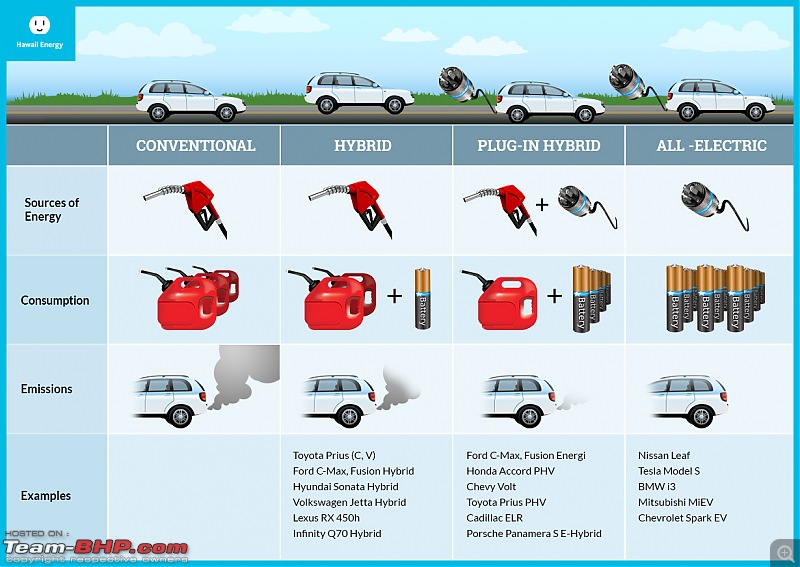 History of Electric Vehicles. ( Please open the image to make it more readable)
History of Electric Vehicles. ( Please open the image to make it more readable) 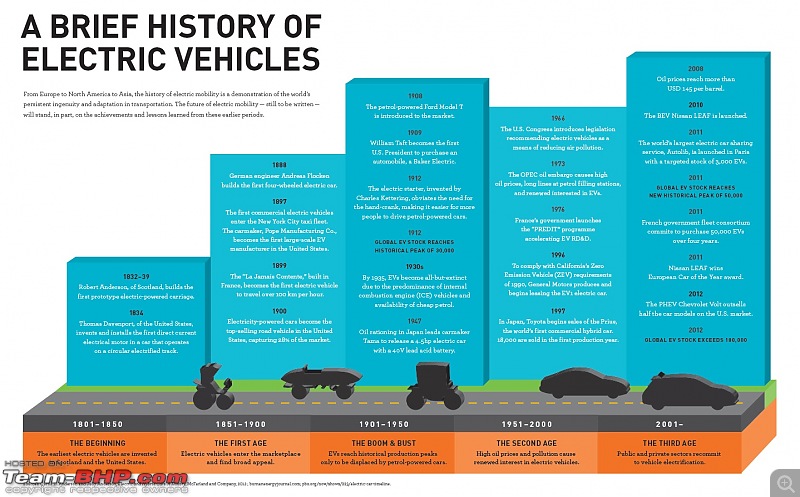
- As indicated above, electric cars have had an extremely interesting history
- The earliest electric cars were invented between 1801-1850, much before Henry Ford invented the motor car.
- Between 1850-1900 EV's actually entered the market place and found broad appeal
- The period between 1900 and 1950 marked the peak as well as the decline of EV's. With the invention of the petrol powered cars and eas availability of gas, the interest in EV's started declining. By 1935, they were all but extinct.
- Towards 2000 with the spiraling gas prices and increased pollution levels, the interest in EV's again picked up.
- By 2010 the interest in EV's picked up again. Several models were introduced which gained immense popularity.
- In the last 2-3 years, the EV worldwide stock has increased exponentially (Details covered in next post)
This article also has a very nice interactive timeline showing the history of the Electric Car
Sources:
Alternate Fuels Data Center
The Electric Vehicle Initiative:
- The Electric Vehicles Initiative (EVI) is a multi-government policy forum dedicated to accelerating the introduction and adoption of electric vehicles worldwide.
- EVI is one of several initiatives launched in 2010 under the Clean Energy Ministerial (CEM), a high-level dialogue among energy ministers from the world’s major economies.
- EVI currently includes 16 member governments from Africa, Asia, Europe and North America, as well as participation from the International Energy Agency (IEA). Participating countries include Canada, China, Denmark, France, Germany, India, Italy, Japan, the Netherlands, Norway, Portugal, South Africa, Spain, Sweden, the United Kingdom, and the United States.
- Below is a global snapshot of the EV Landscape prepared by EVI
Global EV Picture (Open and zoom for enhanced clarity)
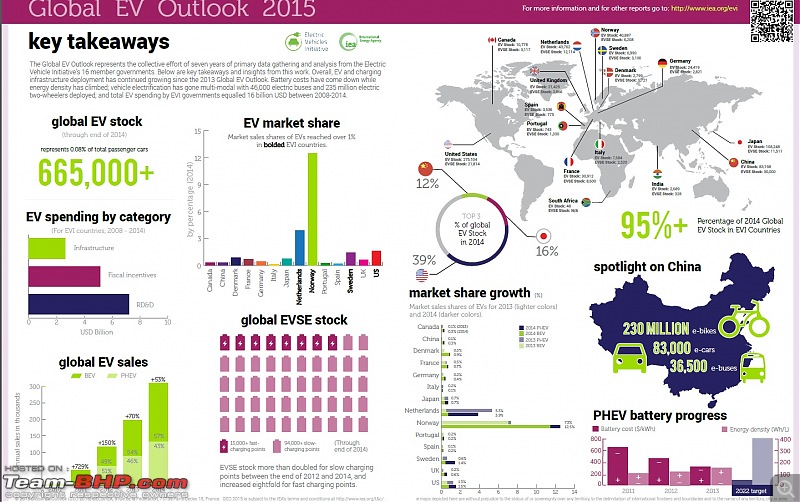
- Through the end of 2014, total EV stock worldwide is ~665,000 vehicles.
- This represents only .08% of the worldwide car sales. US, China and Japan are the Top 3 with respect to EV Sales.
- Norway has the highest share of the EV's. Even then it is only ~12%.
- The major spotlight is on China. EV sales have been booming in China. In the first 9 months of 2015 alone, 136,733 unit were sold. This is more than double the corresponding 2015 number.
- China is set to become the top seller of EV's in 2015, surpassing the US. But this growth to a large extent is driven by government initiatives. EV's are exempted from the registration cap followed by many cities. they are also exempt from any rush hour restrictions (Like the Odd-Even rule).
- In the US, which has been the biggest market for EV's, the growth is slow. With falling fuel prices, focus is back on the big SUV's.
- Overall EV sales are set to touch 1 million in 2015.
Sources:
EVI Official Site
Country/Government and Manufacturer Initiatives:
The governments of countries where the sales are huge have started to realize that pollution is a serious concern and needs to be looked at. Several incentives and subsidies have been launched to promote EVs. In addition, emission norms and regulations have been made stricter. This in turn have prompted manufacturers to invest heavily in EV Research.
Below table shows a sample of the normal registration process and benefits to EV's for the key EV markets. This data is from a 2013 paper. 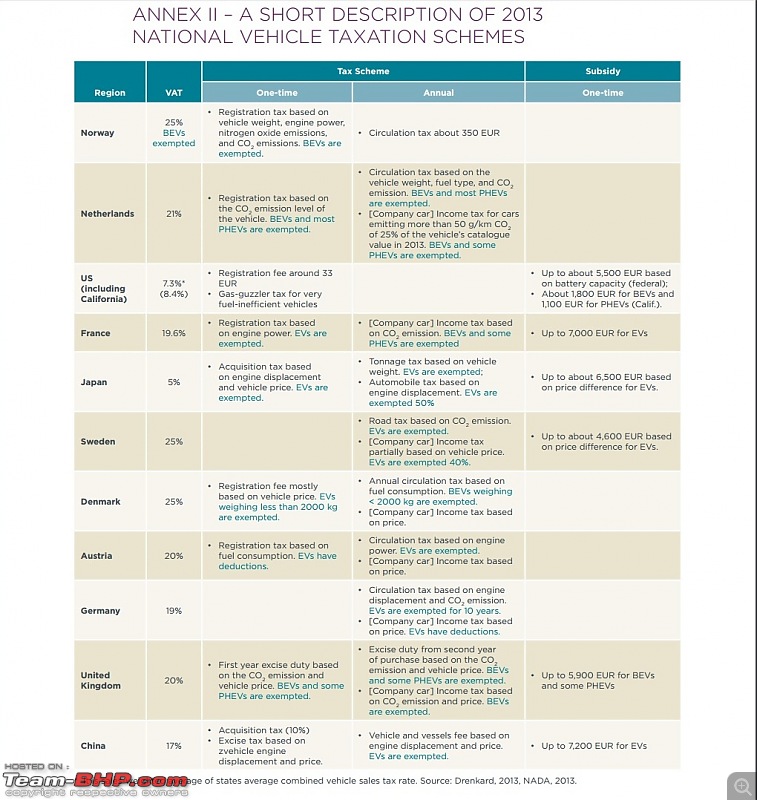
Notes: - China has updated the subsidies to encourage the sales of EV further. This post in the China sales thread has some more details on China's EV Landscape. Link
- India benefits have been covered in the dedicated post for India.
Manufacturer Focus. In the last year, several manufacturers have launched dedicated initiatives to grow/expand the EV Portfolio. A quick look
.
Ford: Ford very recently launched a Vision 2020 EV Plan. Summarized well in the chart below.
Volkswagen: VW after being hit by thee emission scandal, has been talking about focusing more on the EV Space. An extract from their most recent plans for CES 2016
Quote:
Volkswagen reportedly plans to revive the Microbus's classic look for an EV concept at the 2016 Consumer Electronics Show, but the first teaser for the vehicle suggests a more futuristic design with an illuminated grille and squinting headlights. Rumors hint that the full shape includes some vintage cues from the van, including short overhangs, a wide D-pillar, and boxy overall aesthetic.
VW wants to use this concept as a way to point the way toward its future and probably encourage CES visitors to forget a little about the company's present. The brand's chairman will debut the EV during his CES keynote on January 5 where he will focus on "the latest developments in electromobility as well as the next generation of connectivity."
|
General Motors: GM currently has only one All Electric Car (Spark EV), but is now increasing its focus on Electric Cars
Quote:
General Motors is getting serious about electric cars.
The automaker revealed that it is partnering closely with LG to produce an electric motor, battery cells, and other components for its new Chevrolet Bolt EV, which will travel more than 200 miles on a single charge and go into production during late 2016.
GM currently only offers one other all-electric car, the Spark EV, and it only has a range of about 80 miles on a single charge.
|
Toyota: Toyota The world’s best-selling auto maker recently said that by 2050, gas-electric hybrids, plug-in hybrids, fuel-cell cars and electric vehicles will account for most of its global vehicle sales, without giving a detailed breakdown. Unlike others, Toyota believes that Hydrogen Fuel Cell based cars are going to be more prevalent than EV's
Quote:
Toyota, which has focused on hybrids, last year started selling fuel-cell cars that run on hydrogen and emit only water from the tailpipe. Fuel-cell cars, which can be charged in minutes and have a longer driving range than electric vehicles, are more suited for long-distance driving than electric cars, Toyota has said.
Toyota’s Mirai fuel-cell car can run 312 miles with a full-tank of hydrogen based on U.S. testing standards. Rival Nissan Motor Co.’s Leaf electric car has an average range of 84 miles with a fully charged battery, while U.S. startup Tesla Motors Inc.’s Model S electric car has a range of 230-270 miles.
|
Sources
India and EV's
India is a developing, cost conscious market where the automobile sales itself is slowly ramping up. Hence, unlike other matured markets, India has a long way to go before EV's can make any kind of impact. Having said that, along with the rest of the world, there is a big focus on Electric Vehicles in India.
Government Initiatives and Incentives: The government recently launched hte FAME India - Faster Adoption and Manufacturing of Hybrid and Electric vehicles in India - is a part of the National Electric Mobility Mission Plan. As part of this scheme, depending on technology, battery operated scooters and motorcycles will be eligible to demand incentives ranging between Rs 1,800 to Rs 29,000. Similarly in three-wheelers it is from Rs 3,300 and Rs 61,000. In four-wheelers, the incentives range from Rs 13,000 to Rs 1.38 lakh, while in light commercial vehicles it is from Rs 17,000 to Rs 1.87 lakh, and for buses it is from Rs 34 lakh to Rs 66 lakh.
The government is also planning to develop Electric Vehicle Platforms.
- Part of the already existing FAME (Faster Adoption and Manufacturing of (Hybrid &) Electric Vehicles) scheme.
- Instead of just providing incentives, the government has picked the baton of building EV platforms.
- Plan is to Develop indigenous EV platforms for Two-Wheelers, Cars and commercial vehicles. Target to launch commercially within 2 years. Investment of 1600 crore
- Major OEM's are on board and part of the research and development. Each OEM can brand and sell the approved prototypes. But the underlying framework and components will be standard. (Assume it is like our Android Phones).
- Primary focus on 2 wheelers where currently most EV's in the market use imported components.
- Second focus is cars. The major players in the EV market world wide are not looking at India as a viable option nor are they creating platforms with India in mind. This project hopes to overcome that.
- Third focus is the commercial sector.
Manufacturer Focus: - At this time India has only one Full Electric Vehicle. Which is the E2O. Toyota sells the Camry Hybrid and Prius in India, but at a very high price.
- Apart from this Maruti and Mahindra has begun to incorporate mild Hybrid Technology (SHVS) in some of its models. These do not reduce emissions, but help more in better efficiency.
- Mahindra and Maruti are involved in EV related work. But it is not significant.
- Biggest roadblock is price vs value. The Mahindra E2O even with incentives costs as much as a premium hatchback.
A look at the EV's currently on sale in India Mahindra E2O 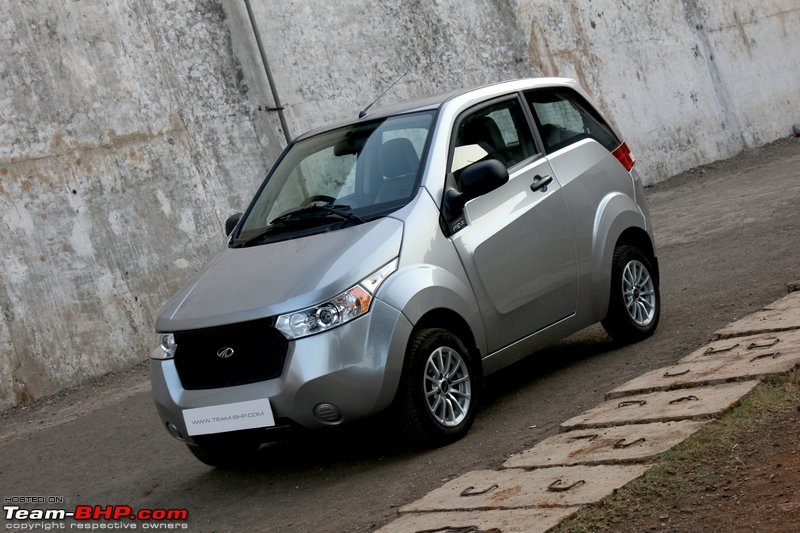
Notes:
- A full Electric Vehicle. Hence limited range (~100 km).
- The cheapest and only mass market EV available in India
- Costs ~6-7L in most places even with incentives. Poor price to utility proposition.
- Powered by a 19 kW (kilo-watt) electric motor. That translates to about 25.5 BHP @ 3,750 rpm
- Team-Bhp Official Review
Toyota Camry Hybrid 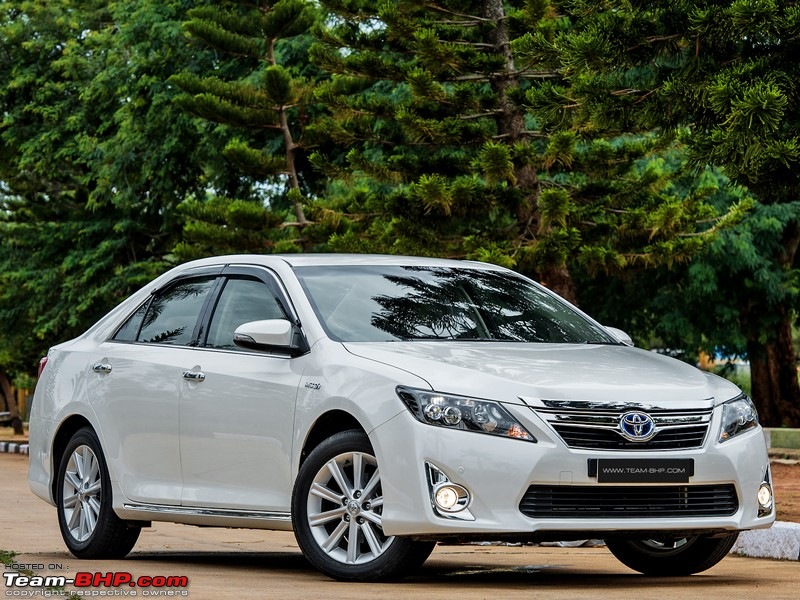
Notes:- A Hybrid Vehicle
- Powered by a 2.5L 158 BHP/ 213. The electric motor that can produce 141 BHP and 270 Nm torque. The total power available at the wheels isn't the sum of the two, but limited to a max of 202 BHP.
- Priced at ~32L Ex-Showroom Delhi.
- Sells pretty well considering the segment. 100-125 units per month. As per reports 70% sales are of the Hybrid Variant.
- Team-Bhp Official Review
Toyota Prius 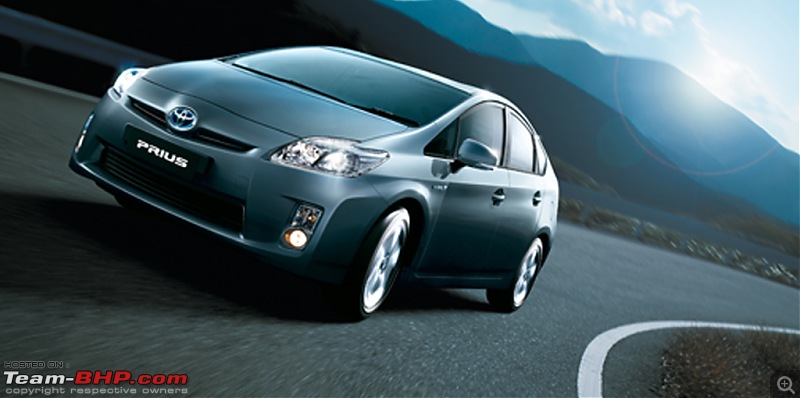
Notes:- Type: A hybrid vehicle. Battery cannot be externally charged.
- Powered by a 60 KW motor producing 2017 Nm Torque in addition to the 1.8L Petrol Engine. Can move from start with electric power.
- With an Ex Showroom of 38L Delhi, pretty much irrelevant to the Indian Market.
Mahindra Scorpio, Maruti Ciaz and Ertiga : Mild Hybrid options. Primarily focused on improving efficiency. Mainly by switching off the Engine when at a standstill.
An Honorable Mention- The Honda Civic Hybrid (2008-2010) 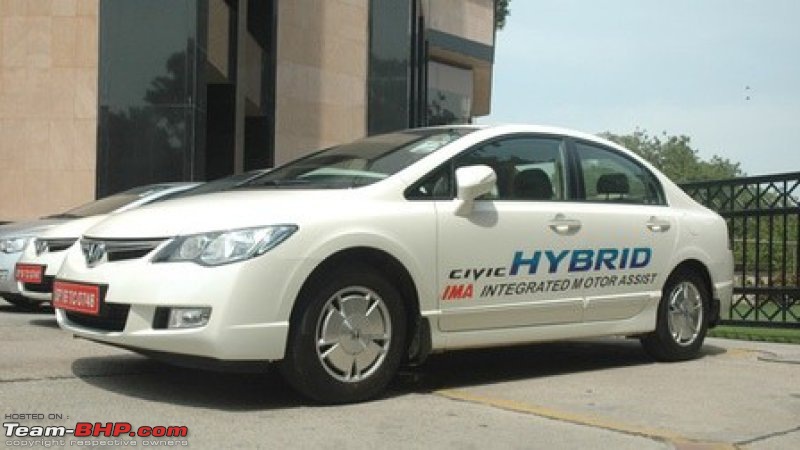
- India's first Hybrid-Launched by Honda in 2008.
- The Honda Civic Hybrid System featured a 3-stage i-VTEC + IMA that employed Honda's 1.3L i-VTEC (Variable Valve Timing and Lift Electronic Control) engine to provide three stages of valve timing (low-speed, high-speed, and cylinder idle mode), combined with a compact and efficient electric motor, Honda's IMA (Integrated Motor Assist) system.
- The Civic Hybrid fell somewhere between a Mild Hybrid and a Hybrid. It did have a dedicated Electric Motor, but it was too small to power the car just by itself.
- Imported as a CBU and cost ~22L in 2008. Later Honda cut the price by ~8L to encourage sales. But sales remained insignificant and it was finally discontinued in 2010.
- Probably a car well ahead of its times.
Future of EV's in India: Probably if this question was asked a month back, the answer would be- Very Bleak. But suddenly with the focus on pollution levels, implementation of odd-even rules and the diesel bans, there is renewed interest in cleaner, efficient modes of transportation. Most of the diesel buying customers, buy it only for the increased efficiency and lower fuel costs. This use case can be met by PHEV provided they are made affordable.
Having said that, at the time of writing, there is not much to look forward to in this space. The EV that would work best for India would be Plug In Hybrid EV' (PHEV). These vehicles can be charged and can run 50-60 km purely on battery and can switch to gasoline when needed. In a predominantly one car per household country like India, PHEV's can be successful. Battery powered run for the local intra city daily commute and gasoline for the long drives.
The only PHEV that has been showcased in India is the Swift Range Extender from Maruti.
- Showcased at the 2014 Auto Expo
- Powered by a 658cc inline three-cylinder petrol engine in tandem with a 55kW electric motor mounted on the front-axle.
- There’s a 5kWh lithium ion battery which can power the car for a range of 25.5km, and takes around 90 minutes to get fully charged via a a 200V socket.
- The Swift Range Extender is around 130kg heavier than its conventional petrol-engined counterpart currently sold in India, which weighs around 960-990kg. Maruti claims that the Swift Range Extender offers a combined fuel efficiency of up to 48.2kpl.
- As Maruti did with AMT, this can potentially pioneer the PHEV space in India. Something like this in a mass selling car like the Swift can really kick of this space and also encourage global manufacturers to bring their PHEV products into India
Apart from this, a Mahindra Verito EV has been doing the rounds for the last couple of years. No official info about launch.
EV Adoption and Popularity Challenges
As mentioned in the second post, total EV sales are a minuscule percent of the global sales. Even with the aggressive growth in the China Market, global EV sales are expected to just cross 1 million in 2015. This is less than the monthly sales of US, China or Europe. So what are the key challenges being faced for EV Sales growth?
- The Image Problem: The initial image of EV's were slow, boring, poorly designed and not practical. Something like the image Automatics had in India. Elon Musk (Founder of Tesla) told in an interview that he started Tesla because he wanted to show the world that electric vehicles were not “ugly and slow and boring like a golf cart.” Although he did succeed in that with the Tesla, from a mass market perspective, this image problem still remains.
- Affordability: The biggest challenge. EV's are still way too expensive. Most governments give a lot of subsidies to promote EV's. But inspite of that, the price to value ratio is pretty low and most EV's cannot compete with conventional cars in a similar price range.
- Charging Stations: With most EV's having limited range, making them practical means having an extensive network of charging stations. This is not happening and is a problem China is facing. Extensive subsidies have exponentially increased sales, but the associated infrastructure has not been able to keep up.
- Range: The range continues to be a problem for pure EV's. The 100-200km range is just not sufficient. This is one major problem for the E2O in India also. There is a lot of development happening towards EV's with 300-400KM range. The Tesla is the only car with a healthy range, but you need to be really really rich to be able to afford a Tesla.
- Charging times: Unlike a conventional car where you can fill fuel in a minute, EV's need to be charged and this takes time. 4-5 hours of charging time is pretty standard. Fast Charging and Turbo charging are available now along with better batteries. But still some way to go. Long charging times coupled with Range Anxiety is a major issue.
- Dirty Power Plants: One of the key reasons for going Electric is due to environment consciousness. So it does not help that most of the electricity is generated from coal plants which by themselves are big
polluters.
Before winding up, since we are talking about alternative energy sources, there is one other alternative energy vehicle being sold commercially-
The Toyota Mirai 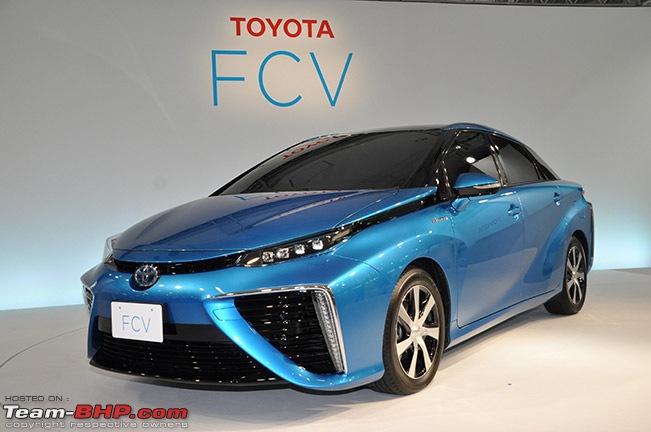
- The Mirai (Means Future in Japanese) is the worlds first commercially available Fuel Cell Vehicle (FCV).
- The Mirai uses a single electric motor delivering 152bhp and 208lb ft.The fuel cell stack, uses a combination of oxygen captured from the air and hydrogen to create the electricity used to power the electric motor.. So what is the by-product- Yes, just water.
- Two separate carbonfibre and glassfibre tanks are used to store the hydrogen – one mounted under the front seat and the other behind the rear seats. Together they provide a combined capacity of 122.4 litres, which is enough to allow the Mirai to provide a claimed range of more than 400 miles. Refilling the tanks takes three to five minutes.
- In the American market the 2016 model year Toyota Mirai will start at US$57,500 before any government incentives, and a leasing option for 36 months will be available with a US$3,649 down payment and a lease rate of US$499 per month. Several states have established incentives and tax exemptions for fuel cell vehicles.
Hope this article helps provide a good insight into the Electric Vehicle Landscape.
Thread moved from the Assembly Line to the International Scene. Thanks for sharing. Learned a lot from your analysis - rating 5 stars!
Thanks a lot for this extensive information. Learnt a lot... I think Toyota is also planning for Corolla hybrid.
Just adding my 2 cents here...
There is a huge gap in acceptance of electric vehicles in India due to the problem of high prices and lack of supporting infrastructure.
Mahindra Reva is prices at 6-7 lakhs which is atleast 2.5 times the price of cheapest petrol car, Tata Nano. Any first time buyer will not be interested in purchasing the Reva due to it's price and limited range.
The best bet in India will be to provide heavy incentives by the government so that the cars become cheaper and can be afforded by many. Also if the prices come down, the urban Indians in search of a small city car, will be attracted towards buying an electric vehicle. Right now, one can get a Suzuki Baleno or Hyundai i20 for the price of Mahindra Reva. There's no wonder why the sales of Reva is so low.
Also in the rural areas, 24 hours electricity is a dream for most part of India, so owning an electric car in the rural areas is a big 'no'. The government is working for it, but it'll take time to reach to a certain level.
At the end of it, every one of us needs to become more considerate towards the nature and natural resources and think about the world at a larger scale. An old dialogue but relevant here ' 'Switching of the lights and fans when not in use in the urban area, can provide electricity to a rural home for a couple of hours'.
Thanks for reading.
Excellent report Rajeevraj. Rated a well deserved 5 star.
Quote:
Originally Posted by Rajeevraj
(Post 3870681)
- The major spotlight is on China. EV sales have been booming in China. In the first 9 months of 2015 alone, 136,733 unit were sold. This is more than double the corresponding 2015 number.
- China is set to become the top seller of EV's in 2015, surpassing the US. But this growth to a large extent is driven by government initiatives. EV's are exempted from the registration cap followed by many cities. they are also exempt from any rush hour restrictions (Like the Odd-Even rule).
|
I was just reading yesterday how a little known Chinese company called NextEV plans to take on Tesla and other electric vehicle startups by bolstering its technology leadership. Its betting big on Chinese market. They seem to have a big warchest also. They were in hibernation mode till now and have started hiring big guns. They plan to have their cars rolling out by 2016 end itself.
This becomes another company trying to have a bite of market now dominated by Tesla. There are many companies now who are developing EV for masses like Faraday Future, Atieva, NextEV, and Karma (formerly Fisker). It will interesting to see this market grow.
Source
:OT I also follow the developments of startup "Ather Energy" based in Chennai/Bangalore. They are developing electric scooter and their prototype scooter looks good as per me. They came to spotlight when they got funding from Flipkart year back I think
Ather Energy Website
P.S: I am no where related to either NextEV or Ather Energy.
Beautiful and informative article. Thanks Rajeevraj. Needless to say, that EV (in all flavors) is the most happening development in the auto industry. We sure will witness a turning point in the automotive industry - with lots of EV technology, trial and error, and ultimately maturing of some select technologies ready for mass adoption. Auto manufacturers will come out good on this aspect - no doubt.
The concern will be accompanying EV infrastructure, driven by government policies. And I think we have an alliance that will help governments (trend-setters), to take those early steps. A few weeks back, I had come across the International Zero Emission Vehicle (ZEV) alliance (
website). This alliance has a very ambitious plan -
Quote:
The International Zero-Emission Vehicle Alliance (ZEV Alliance) is a collaboration of national and subnational governments working together to accelerate adoption of ZEVs. The participants set ambitious, achievable targets for ZEV deployment, take actions to achieve those targets as appropriate in each jurisdiction, act together to achieve individual and collective targets, and encourage and support other jurisdictions in setting and achieving ambitious ZEV targets.
|
Quote:
On 3 December 2015, at the Paris COP, the participants in the International Zero-Emission Vehicle Alliance jointly committed to strive to make all passenger vehicle sales in their jurisdictions ZEVs as quickly as possible, and no later than 2050
|
Simply put, the alliance wants to phase out sale of petrol/diesel cars all-together by 2050 in the jurisdictions of the respective alliance participants :) So definitely we will be witnessing a lot of R&D in this area. This alliance should lead to mass EV infrastructure, that will eventually be endorsed by the late-adopters.
I believe, solar power is worth exploring here too. We definitely have a lot of sunshine, to keep car batteries charged. Solar cells are expensive right now. Hopefully with time, this technology will be up for grabs too.
On another note, your article mentions
Regenerative braking systems. This is quite interesting. For those interested in a deep dive of how this works, do refer to
How Stuff Works
I would really be interested to understand what are the good electric bike options available for us in India.
how would the batteries be scrapped once they are beyond their useful life?
governments will need to come up with procedures that dont impact the environment, else we are back to square one: damage to planet due to use of fossil fuels Vs damage caused by dumping used batteries
Quote:
Originally Posted by maven
(Post 3872974)
how would the batteries be scrapped once they are beyond their useful life?
governments will need to come up with procedures that dont impact the environment, else we are back to square one: damage to planet due to use of fossil fuels Vs damage caused by dumping used batteries
|
The EV batteries don't have to be scrapped once they reach their useful life (usually 75% of their maximum capacity) in an EV. They can be used as energy storage for a solar/wind power plant. This ensures that these batteries can be used for another 10-15 years, depending on the size of the storage and health of batteries.
http://www.autoblog.com/2014/02/18/u...-system-japan/ http://reneweconomy.com.au/2014/sola...go-japan-46230
The pollution levels are there anyways.
While we (aam Junta) think it very cool to use electric vehicle such as E2O, what with its massive cost, and projected savings in term of per kilometre running charges, we still need to to introspect on what fuels we use to generate electricity. Many Electricity generating stations still depend on fossil fuels like coal. Burning of coal produces pollution and this is not exactly serving the purpose of running your car on "CLEAN FUEL".
The more adaptibility to Hydro Powerstations, more we save on the environment. But then there is a strong lobby by Coal mine allottees, which brings back to the original question of what defines a clean fuel?
Andy
| All times are GMT +5.5. The time now is 06:32. | |





